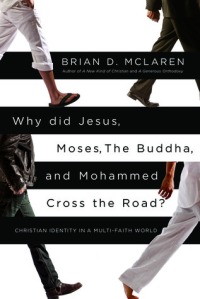Why Did Jesus, Moses, the Buddha, and Mohammed Cross the Road? Christian Identity in a Multi-Faith World, Brian McLaren (Jericho Books) $24.99
 Brian McLaren has a gift for putting his finger on the challenges and opportunities facing the Christian church. Or, some may say, he relishes the chance to put his finger in the eye of the church. A close reading, however, reveals the heart of the author which betrays his deep love for the church and faith in her potential.
Brian McLaren has a gift for putting his finger on the challenges and opportunities facing the Christian church. Or, some may say, he relishes the chance to put his finger in the eye of the church. A close reading, however, reveals the heart of the author which betrays his deep love for the church and faith in her potential.
Published 11 years to the day after the tragic events of September 11, 2001, McLaren invites us to consider afresh a theme that has consumed him for years: generous orthodoxy. [1] Along with many who have been involved in interfaith partnerships and friendships, he is concerned that Christians are hung on the horns of a dilemma: we can either be generous to those outside the boundaries of the Christian faith or we can be orthodox in our beliefs, but not both. McLaren insists there is another way and it’s more than a nice balance of the two extremes. He calls it “strong/benevolent faith;” something many people consider impossible to achieve, not least the main stream commentators and scholars of American social and political life, some of whom argue that monotheism, in particular, is inherently violent. [2]
How can we arrive at this strong/benevolent faith? He proposes a “Great Reformulation” and His prescription is three-fold: doctrinal, liturgical and missional. The generosity McLaren so often speaks of is found in the tone with which he challenges some of the church’s most serious failings. Nevertheless, as with many of his books, this most recent contribution will push many people past their comfort zone.
He is not playing around the edges of theology and church tradition. He is talking about core doctrines of the Christianity, such as creation, original sin, election, the Trinity and Christology. The liturgical challenge he articulates encompasses such central concerns as the Christian Year, the songs the church sings, how the church reads the Bible and baptism (the chapter on baptism is one of the best in the book). He closes the book by describing the reformulation that needs to take places in the church’s approach to mission and it is no less ambitious. In all of this he writes with the experience of someone who has faced the consequences of his ideas many times before and is not naïve about the gravity of what he proposes.
McLaren’s regular readers and friends will find familiar themes in this book—concepts he has been working out for several years in community with faithful Christians around the globe. Even here, these chapters read like suggestions; conversation starters offered to a group of friends who have settled in for a long night of conversation. Each concept is shared briefly—many chapters no longer than 7 or 8 pages—often leaving me with the wish that he had pursued his thoughts a bit longer. However, while McLaren has a gift for making difficult concepts simple, these 29 chapters are anything but simplistic. They are packed with insights from his broad reading. In particular, the work of René Girard features largely in this book; his fingerprints on much of the proposed “reformulation.”
McLaren is not the first person to insist that God is bigger than any of our religious traditions but he does so in a fresh way in this volume with concrete suggestions about how to create a strong and benevolent faith. [3] What a relief that this is not merely another book about how members of various religious groups need to “dialogue” and “get along” with the not-so-subtle subtext that we must lay aside our most cherished convictions to accomplish this. This author does not believe that we can be open to the religious other in spite of our strong Christian faith. He goes much further than this. He believes that the more committed we are to Jesus, the more loving, generous and open to every other person—and all creation—we will necessarily be.
——-
[1] See Brian McLaren, A Generous Orthodoxy (Zondervan, 2006).
[2] Frequent mention is made in this book of Sam Harris and other “new atheists.” Jonathan Kirsch based his book, God Against the Gods (Penguin, 2004), on this very idea.
[3] See Samir Selmanovic, It’s Really All About God: Reflections of a Muslim, Athiest, Jewish Christian (Jossey-Bass, 2009) for another recent example.
RB
[…] Why Did Jesus, Moses, the Buddha, and Mohammed Cross the Road? (Ryan Bell, Hillhurst Review, 11 Sept 2012) Published 11 years to the day after the tragic events of September 11, 2001, McLaren invites us to consider afresh a theme that has consumed him for years: generous orthodoxy. […]